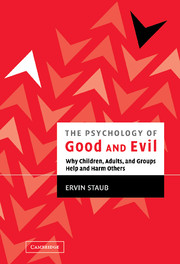Book contents
- Frontmatter
- Contents
- Preface
- Acknowledgments
- PART I INTRODUCTION AND CORE CONCEPTS
- PART II THE ROOTS OF HELPING OTHER PEOPLE IN NEED IN CONTRAST TO PASSIVITY
- PART III HOW CHILDREN BECOME CARING AND HELPFUL RATHER THAN HOSTILE AND AGGRESSIVE
- PART IV THE ORIGINS OF GENOCIDE, MASS KILLING, AND OTHER COLLECTIVE VIOLENCE
- 21 A Note on the Cultural–Societal Roots of Violence
- 22 The Psychology of Bystanders, Perpetrators, and Heroic Helpers
- 23 Steps Along a Continuum of Destruction: Perpetrators and Bystanders
- 24 The SS and the Psychology of Perpetrators: The Interweaving and Merging of Role and Person
- 25 The Origins of Genocide: Rwanda
- 26 Bystanders as Evil: The Example of Rwanda
- 27 Individual and Group Identities in Genocide and Mass Killing
- 28 Mass Murder: U.S. Involvement as Perpetrator, Passive Bystander, Helper
- 29 When Instigation Does Not Result in Mass Murder
- 30 Persian Gulf Conflict Was Reflection of Stormy Undercurrents in U.S. Psyche
- 31 Mob Violence: Cultural–Societal Sources, Instigators, Group Processes, and Participants
- 32 Understanding and Preventing Police Violence
- PART V THE AFTERMATH OF MASS VIOLENCE: TRAUMA, HEALING, PREVENTION, AND RECONCILIATION
- PART VI CREATING CARING, MORALLY INCLUSIVE, PEACEFUL SOCIETIES
- Appendix: What Are Your Values and Goals?
- Index
- References
27 - Individual and Group Identities in Genocide and Mass Killing
Published online by Cambridge University Press: 07 May 2010
- Frontmatter
- Contents
- Preface
- Acknowledgments
- PART I INTRODUCTION AND CORE CONCEPTS
- PART II THE ROOTS OF HELPING OTHER PEOPLE IN NEED IN CONTRAST TO PASSIVITY
- PART III HOW CHILDREN BECOME CARING AND HELPFUL RATHER THAN HOSTILE AND AGGRESSIVE
- PART IV THE ORIGINS OF GENOCIDE, MASS KILLING, AND OTHER COLLECTIVE VIOLENCE
- 21 A Note on the Cultural–Societal Roots of Violence
- 22 The Psychology of Bystanders, Perpetrators, and Heroic Helpers
- 23 Steps Along a Continuum of Destruction: Perpetrators and Bystanders
- 24 The SS and the Psychology of Perpetrators: The Interweaving and Merging of Role and Person
- 25 The Origins of Genocide: Rwanda
- 26 Bystanders as Evil: The Example of Rwanda
- 27 Individual and Group Identities in Genocide and Mass Killing
- 28 Mass Murder: U.S. Involvement as Perpetrator, Passive Bystander, Helper
- 29 When Instigation Does Not Result in Mass Murder
- 30 Persian Gulf Conflict Was Reflection of Stormy Undercurrents in U.S. Psyche
- 31 Mob Violence: Cultural–Societal Sources, Instigators, Group Processes, and Participants
- 32 Understanding and Preventing Police Violence
- PART V THE AFTERMATH OF MASS VIOLENCE: TRAUMA, HEALING, PREVENTION, AND RECONCILIATION
- PART VI CREATING CARING, MORALLY INCLUSIVE, PEACEFUL SOCIETIES
- Appendix: What Are Your Values and Goals?
- Index
- References
Summary
identity and the origins of mass killing and genocide: brief review
I will review and extend here the exploration of origins by describing how individual and group identities are involved in the paths to genocide or mass killing. To begin, severe economic problems deeply impact people. Unemployment, or the inability to provide for oneself and one's family owing to severe inflation, makes people feel insecure and ineffective. Such conditions call into question people's personal identity and self-worth: Who am I if I have no work and cannot take care of the basic material needs of myself and my family? At the same time that identity is questioned, ties to one's group can also weaken because the problems originate in society and social conditions.
Intense political conflict and disorganization also affect people's experience of their group and perception of the world. Rapid social change, which often occurs at times of economic and political crises, adds to social chaos and disorganization. Since substantial social change requires adjustment, even positive change places demands on people.
The different elements of difficult life conditions, which may occur separately but frequently are present in some combination, frustrate many of the basic needs. In difficult times, focusing on their own needs, people become disconnected from each other. At times when they need it most, people lack connection and support.
- Type
- Chapter
- Information
- The Psychology of Good and EvilWhy Children, Adults, and Groups Help and Harm Others, pp. 351 - 359Publisher: Cambridge University PressPrint publication year: 2003



